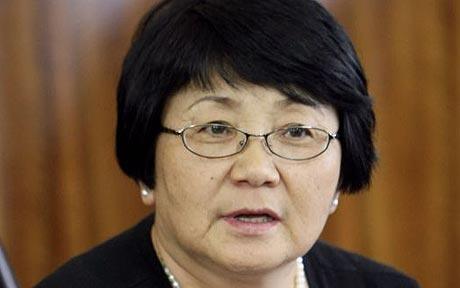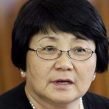
Kyrgyz Government Attempts to Crack Down on Organized Crime
Publication: Eurasia Daily Monitor Volume: 8 Issue: 40
By:

On February 22, Kyrgyz President Roza Otunbayeva said that the country’s major criminal kingpin, Kamchy Kolbayev, was placed on the government’s wanted list. Although many in Kyrgyzstan know about Kolbayev’s criminal’s activity, Otunbayeva’s announcement symbolizes the Kyrgyz police’s attempt to tackle the criminal underworld. Whether these attempts will prove to be successful, however, is doubtful.
Overall, the president said that 80 members of organized criminal groups have been captured to date. Otunbayeva admitted that in order to weaken organized crime, a lot more has to be done and that key leaders of organized crime are still free (www.akipress.kg, February 22).
In the past few years Kolbayev has become the country’s most influential criminal leader able to allegedly traffic drugs and extort businesses without fear of arrest. Kyrgyzstan’s organized crime network has always enjoyed strong leverage of the political domain. During former President Kurmanbek Bakiyev’s reign criminals were able to gain posts in the parliament and government. State and crime domains became so interconnected it was often difficult to distinguish between them. Public figures were responsible for organizing major crimes in the country. Unsurprisingly, under Bakiyev’s reign Kyrgyzstan increasingly served as a transit zone for drug trafficking, with illegal deals possibly brokered at the highest levels of government, bypassing law enforcement agencies
Kolbayev was also wanted by Bakiyev’s regime. However, the former president was either unable or uninterested in capturing the criminal. According to the Kyrgyz press, Kolbayev enjoyed strong support among Russian criminal leaders (www.msn.kg, November 14, 2008). Kolbayev’s compatriot and competitor Rysbek Akmatbayev, in turn, was able to win a parliamentary seat in May 2006. However, Akmatbayev was shot dead days later. For many Kyrgyz this seemed as if Bakiyev preferred to physically eliminate the criminal kingpin instead of dealing with him through law-enforcement agencies.
Since the April 2010 regime change, Kyrgyzstan’s state-crime relations have dramatically changed. On the one hand, the state still lacks full control over all police forces, especially those in the southern parts of the country. On the other hand, claims that the government has launched a major campaign against the criminal underworld testify to the fact that the police are slowly gaining strength over criminal leaders. Kolbayev was captured by Kyrgyz law-enforcement agencies in the aftermath of the ethnic conflict in Osh in June 2010 (www.dv.kp.ru, June 16, 2010). Perhaps fearing negative repercussions, the police refrained from arresting the criminal and released him. Previously, Kolbayev was accused of double homicide and escaping from prison.
The president’s intention to fight organized crime might be genuine, but it is doubtful whether the Interior Minister, Zarylbek Rysaliyev, has enough leverage over the criminal underworld to be able to suppress the country’s strongest criminal leaders. The interior ministry’s campaign against the criminal world might also be a sign of a political struggle between different power institutions controlled by various political parties. The president’s promise to stamp out organized crime may equally be an attempt to show that the new government is trying to increase its control over the entire country. Otunbayeva did not specify why Kolbayev is being targeted at this point (www.akipress.kg, February 22).
Today, some leaders of the criminal underworld collaborate with individual government officials and members of parliament (MP’s), as well as political groups represented in the government in order to maintain their own presence in the shadow economy. Two important factors have influenced the new state-crime dynamics in Kyrgyzstan. First, some old corruption schemes were distorted by the new actors in power who replaced the family members of former president Bakiyev. Second, state power is decentralized in the new parliament, composed of 120 members representing five political parties and the government. Nonetheless, Kolbayev is unlikely to be captured anytime soon. Whether he will be forcefully eliminated like Akmatbayev is one possible scenario. Kolbayev might prefer to strengthen his own contacts with government officials and MP’s to secure continuity his continued involvement in the shadow economy.
Capturing Kolbayev, however, will not solve Kyrgyzstan’s problems with organized crime. It is often in state officials and law-enforcement personnel’s interests to perpetuate the activities of organized criminal groups’ in order to benefit from the shadow economy. Until corruption is reduced among senior officials, including the heads of power institutions, Kolbayev-types will continue to operate freely.




